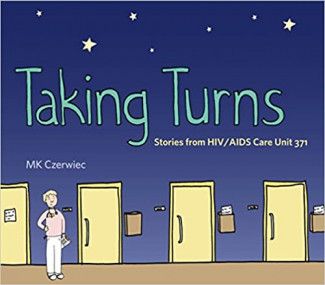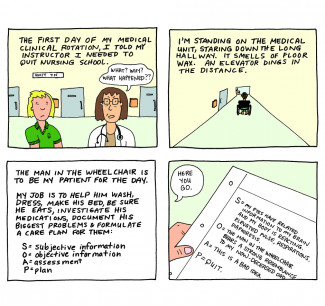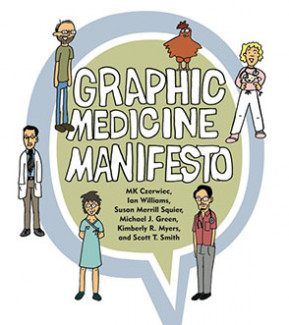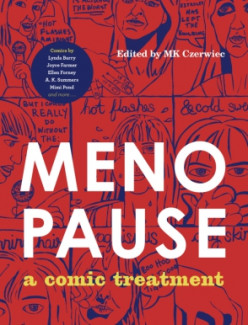
Johns Hopkins UniversityEst. 1876
America’s First Research University
Literature and Medicine welcomes Comics Editor MK Czerwiec

The journal Literature and Medicine recently welcomed its new editorial board, including MK Czerwiec, who has been named the journal’s first Comics Editor. MK Czerwiec is a nurse, educator, author, comic creator, and one of the co-creators of the field of “Graphic Medicine” - the intersection of the medium of comics and the discourse of healthcare. She co-manages the website, podcast, annual conferences, and online community of GraphicMedicine.org. MK teaches graphic medicine at Northwestern Medical School, the School of the Art Institute of Chicago, the University of Illinois Medical School, and the University of Chicago. She is an Artist-in-Residence at Northwestern’s Center for Medical Humanities and Bioethics.
JHU Press recently had the privilege of joining MK in a conversation about her work developing the field of Graphic Medicine and her new role at Literature and Medicine.

Your first book, Taking Turns: Stories from HIV/AIDS Care Unit 371 is a graphic memoir that chronicles your time as a nurse in the mid-1990’s. What drove you to nursing?
I’ve always been interested in stories. I have a very strong narrative drive. I had always hoped I could find a place in the arts, but I never really thought I would - or could. I got my first degree in English and Philosophy, and thought I was going to be a writer. But after graduation, I realized finding a job as a writer that would keep me fed and housed was really difficult. Eventually I looked to nursing, which seemed a natural fit - not only was my mom a nurse, but also my dad had been ill and we took care of him at home, and so already I had a lot of the skills in place from caring for my father.
How did you end up working in an HIV/AIDS unit?
My father died during my first clinical rotation, and I was going to quit nursing school. I thought “Oh my gosh, what was I thinking? I don’t want to take care of other people - this is too hard. Because it all would remind me of him.” My clinical instructor said, “Go home today, I’ll figure something out.” And when I came back the next day, she said “I figured out what to do. I’m going to have your clinical be on the HIV/AIDS unit of the hospital. The patients are much younger and they won’t remind you of your dad.” That’s how I got into AIDS care. After just a few days, I had found my passion and my vision for my future career.
Was it during this time you started creating comics?
Yes. Nurses will tell you you can learn a lot of technical skills and technical information in nursing school, when it comes to caring for a patient, but that first year is incredibly overwhelming because you realize how much you didn’t learn about the practicalities of being a nurse. In my case, it was so incredibly overwhelming, for all the things that are overwhelming to begin with, but add to that it was 1993, coming out of the height of the AIDS crisis - I started making comics out of necessity.
In an effort to process some difficult experiences from work, one day I found myself making a little drawing, putting a few words over it, making a box, and making another drawing, adding a few words. And I suddenly realized, “I’m making a comic.” And it worked. Writing in a journal wasn’t working, images alone weren’t working. There was something about combining image and text sequentially that helped me reflect on these experiences in this powerful, immediate way to process things that were really haunting me about clinical care. It just worked.

How did that work grow to fit into the field of health humanities?
I was making comics and having a really positive response from people in my life, I started asking more questions about the medium - what is the work that stories are doing? I wanted to inform the comics I made with theory about story. Since I’m telling stories about my work as a nurse, what are the ethical obligations? What are my responsibilities to the other people in the story, that their stories are not mine to tell, how do I navigate that? I was fortunate to find medical humanities and bioethics to help me navigate those questions.
The way all of these things came together was that I connected with a doctor in Wales, Ian Williams. Ian coined the term “Graphic Medicine” as part of his Master’s Thesis. He and his colleagues Susan Squire and Michael Greene organized the first Graphic Medicine conference in 2010. I saw a call for it and took a huge leap of faith and went - I had no idea that this would be the work of my life for the next ten years.
Why do you think this genre is gaining so much momentum and popularity, so quickly?
First, I think it brings together parts of people’s lives and work that they thought never could have a relationship. There’s an excitement that two worlds can come together, be productive, and we are starting to gather evidence in the ways that this works as a tool for both caretakers and patients. Also, there is a rising realization that graphic novels and memoirs can have serious uses - they are not only about educating kids - they can do important work and be taken seriously as literature. They have their own registers that they operate on, and can be just as sophisticated in the ways in which text creates metaphors. The ways this medium can be used as a teaching tool is opening windows for caregivers, educators, students - literally through the panes of a comic. You can read all you want about the pathophysiology of, say, Parkinson’s Disease, but you are going to be a much better caregiver if you actually know what the lived experience of Parkinson’s is like. That’s what drives narrative medicine - the story, the lived experience.
What do you enjoy about teaching this medium? Do medical students put up resistance to artistic expression? 
My chapter in the Graphic Medicine Manifesto is called “The Crayon Revolution” - I really believe all of us have an incredibly powerful visual style, we just maybe left it back in 3rd or 4th or 5th grade, when we were told to leave the crayons behind and start using words. I get medical students who have never drawn or said, “I’d love to do this, but I can’t draw.” But the truth is, we do a quick exercise, and suddenly they realize, “Oh, I guess I can.” You’re creating a visual narrative with the skills you have - you can do this work with the most basic of visual ability.
One of the things that is amazing about teaching the humanities in medical schools and nursing schools is that the students are so overwhelmed by the work that they are doing, and all of the text, they have to read that Graphic Medicine is a really efficient, quick way to communicate information. Yes, they are reading a book about cancer, but they are actually enjoying the experience of engaging with that story and the text. There is something about that visual appeal. I remember one med student who read a graphic novel said “I had things to do but I just picked it up and I never put it down - I read the whole story.” It is easily consumed and enjoyable.
One of my prompts I give my med students is “Draw a clinical encounter.” It’s a whole different way of looking and exploring and contemplating the elements of that experience, when I ask them to draw it. They look at things like “What size do I draw myself in relation to my patient? What elements of the room are there? Where is the computer in relation to us - it is coming between us? What am I feeling?” And we have tools in comics - things like the thought bubble versus the speech bubble, “What am I thinking doing this history and physical - what am I worried about?” They represent their authentic selves, versus the self they are putting forward to the patient in their speech bubble. And it goes both ways - they take an empathy shift and can draw what the patient is telling them, but also imagine what the patient is worried about and not telling them. Because we are working in this visual register I feel like we are exploring whole other dimensions of this experience that perhaps writing an essay might not.
What will your role as Comics Editor of Literature and Medicine entail?
I will be curating at least one comic per issue, starting with the upcoming issue this December. Every issue of Literature and Medicine has a theme, so I hope to find pieces that tie in beautifully with the theme.
Are you working on another book now? What’s next for you?

An anthology I edited called Menopause was just published this August. I am now looking towards an edited anthology about nursing. The goal of this anthology is to through comics show the work of many different kinds of nurses - whether it’s school nurses, emergency nurses, hospice nurses, chaplaincy nurses, the range of work in the many different environment nurses are working in - I want to show that work and tell stories from those areas.
I’m also starting to formulate a memoir, based on my area of focus which is end of life care. If Taking Turns was about doing that as a professional, my next book will be about doing that for my own family - my Mother and her sister, my Aunt. Someone once said “a good death is really hard to orchestrate”. I’m exploring many aspects of what that means.
For further reading on Graphic Medicine, check out the Spring 2014 issue of the journal Configurations, which features a comic from MK Czerwiec.


